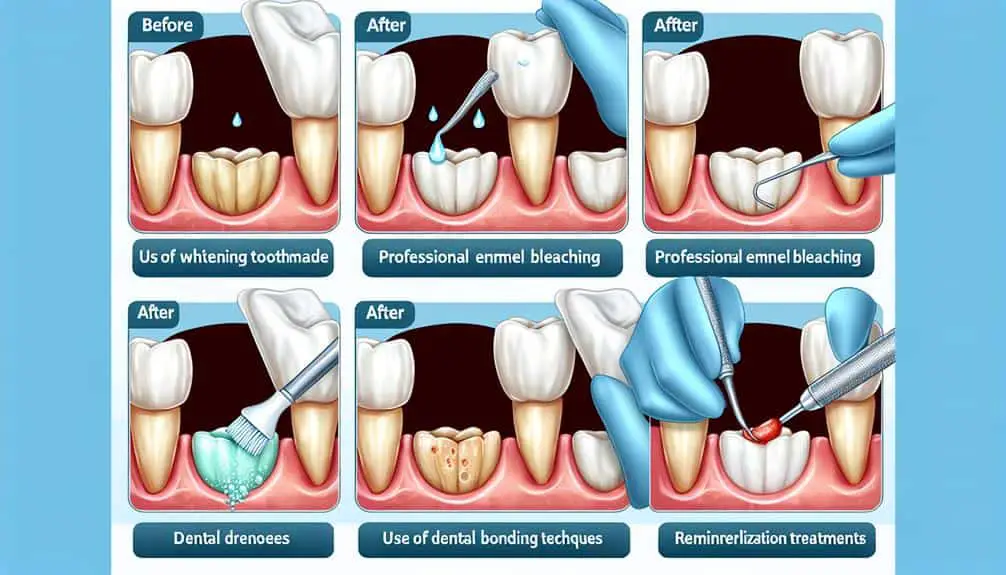To preserve the strength of your enamel while whitening your teeth, opt for enamel-friendly whitening products containing potassium nitrate or fluoride for added protection against sensitivity and enamel erosion. Follow the instructions carefully, and avoid overusing products to prevent damage. Maintain good oral hygiene by limiting sugary and acidic foods, opting for a balanced diet, and incorporating natural remedies like oil pulling. Regular consultations with your dentist are essential for monitoring whitening procedures and ensuring enamel safety.
Consider using desensitizing toothpaste with key ingredients like potassium nitrate or strontium chloride for reduced sensitivity. These tips will help you achieve safe and effective whitening results while safeguarding your enamel health.
Key Points
- Use enamel-friendly whitening products with potassium nitrate or fluoride.
- Limit frequency of whitening treatments to prevent enamel damage.
- Maintain good oral hygiene practices to preserve enamel strength.
- Regularly consult with a dentist to ensure enamel safety.
- Incorporate desensitizing toothpaste to reduce tooth sensitivity.
Choose Enamel-Friendly Whitening Products
To safeguard the strength of your enamel while whitening your teeth, opt for whitening products specifically formulated to be gentle on enamel. Enamel protection is vital when it comes to whitening safety. Look for products that contain ingredients like potassium nitrate or fluoride, which help fortify enamel while whitening the teeth. These components can help minimize sensitivity and safeguard your enamel from damage during the whitening process. Additionally, choosing a reputable brand that's recommended by dentists can also guarantee that you're using a safe and effective product.
When selecting an enamel-friendly whitening product, read the label carefully to check for any harmful abrasives or harsh chemicals that could potentially harm your enamel. Avoid products with high levels of peroxide, as these can weaken enamel over time if not used correctly. By being mindful of the ingredients in your whitening products and opting for enamel-safe options, you can effectively whiten your teeth while maintaining the strength and health of your enamel.
Limit Whitening Treatments Frequency
Consider reducing the frequency of your whitening treatments to safeguard your enamel and maintain oral health. Overusing whitening products can lead to enamel erosion and other adverse effects on your oral cavity. Here are some tips to help you limit the frequency of whitening treatments:
- Consult with a Dentist: Before starting any whitening regimen, consult with your dentist to determine the most appropriate treatment frequency for your oral health needs.
- Follow Instructions: Adhere strictly to the guidelines provided with the whitening product to avoid overuse, which can contribute to enamel damage.
- Monitor Sensitivity: If you experience heightened tooth sensitivity or gum irritation, reduce the frequency of whitening treatments to allow your teeth to recover.
- Consider Professional Treatments: Opting for professional whitening treatments at your dentist's office can be a safer choice to safeguard enamel protection and minimize side effects.
Maintain Good Oral Hygiene Practices
Maintaining good oral hygiene practices is essential for preserving enamel strength and overall oral health. Your diet impacts not only your general health but also the health of your teeth. Foods high in sugar and acids can contribute to enamel erosion, so it's vital to limit these items. Instead, opt for a balanced diet rich in fruits, vegetables, lean proteins, and dairy products to provide essential nutrients for strong teeth.
In addition to a healthy diet, consider incorporating natural remedies into your oral hygiene routine. For example, oil pulling with coconut oil has been suggested to reduce harmful bacteria in the mouth, promoting better oral health. Moreover, green tea contains antioxidants that can help fight bacteria and reduce the risk of cavities.
Consult With a Dentist Regularly
Regular consultations with your dentist are essential to maintaining peak oral health and addressing any concerns early on. These regular check-ups not only help in keeping your teeth and gums healthy but also provide an opportunity to receive professional advice tailored to your specific needs. Here are four reasons why consulting with your dentist regularly is important:
- Early Detection of Issues: Dentists can identify early signs of dental problems like cavities, gum disease, or enamel erosion during routine check-ups, allowing for prompt treatment and preventing further damage.
- Customized Oral Care: Your dentist can provide personalized advice on oral hygiene practices, diet, and lifestyle habits to help you maintain peak oral health.
- Professional Cleanings: Regular dental visits include professional cleanings that remove plaque and tartar buildup, reducing the risk of cavities and gum disease.
- Monitoring Whitening Procedures: If you're undergoing teeth whitening treatments, your dentist can monitor the process to ensure it's done safely and without compromising your enamel strength.
Use Desensitizing Toothpaste
To reduce tooth sensitivity, consider incorporating desensitizing toothpaste into your oral care routine. Tooth sensitivity, often caused by enamel erosion, can make teeth whitening treatments uncomfortable. Desensitizing toothpaste works by blocking the nerve pathways that lead to the tooth's inner pulp, reducing the sensation of pain or discomfort associated with sensitivity.
When selecting a desensitizing toothpaste, look for key ingredients like potassium nitrate or strontium chloride. These compounds help to calm the nerves in your teeth, providing relief from sensitivity. Additionally, desensitizing toothpaste often contains fluoride, which aids in enamel protection. Fluoride strengthens the enamel, making it more resistant to acids and preventing further erosion.
Incorporate desensitizing toothpaste into your daily oral care routine by using it consistently. Brush your teeth gently with the desensitizing toothpaste at least twice a day for best results. Remember, maintaining good oral hygiene practices alongside the use of desensitizing toothpaste is essential for preserving enamel strength while whitening your teeth.
Frequently Asked Questions
Can I Still Drink Coffee and Tea While Whitening My Teeth With Enamel-Friendly Products?
You can enjoy coffee and tea while whitening with enamel-friendly products. Consider tea's potential for staining teeth and explore alternatives. Discover coffee substitutes that come with benefits like lower acidity. Prioritize your dental health without sacrificing your favorite beverages.
How Long Should I Wait Between Whitening Treatments to Prevent Enamel Damage?
To maintain enamel health and maximize whitening effectiveness, it is advisable to wait at least 1-2 weeks between treatments. This waiting period helps prevent enamel damage while ensuring the long-term maintenance of your enamel strength.
Are There Any Specific Oral Hygiene Practices I Should Avoid While Whitening My Teeth?
When whitening teeth, avoid abrasive toothpaste and aggressive brushing habits to protect enamel. Steer clear of acidic foods and harsh mouthwashes that can further weaken enamel. Opt for gentle oral care products for best results.
How Often Should I Schedule Dental Check-Ups While Undergoing a Whitening Treatment?
You should schedule dental check-ups every six months while whitening your teeth. Regular visits allow your dentist to monitor the effects of the treatment on your enamel and overall oral health, ensuring a bright and healthy smile.
Can Desensitizing Toothpaste Be Used as a Preventative Measure for Enamel Sensitivity During Whitening Treatments?
To protect enamel and prevent sensitivity during whitening treatments, consider using desensitizing toothpaste. This gentle option can help maintain enamel strength while minimizing discomfort. Regular use as a preventative measure may aid in preserving your teeth.



